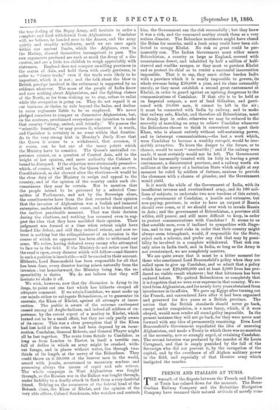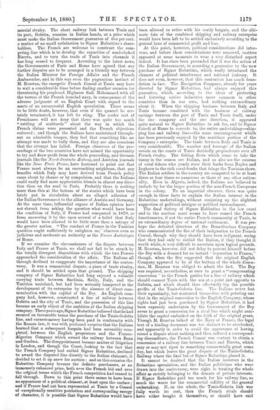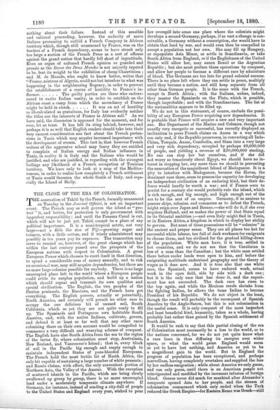FRENCH AND ITALIANS AT TUNIS.
THE warmth of the dispute between the French and Italians at Tunis has calmed down for the moment The Bona- Guelma Railway Company and the Rubattino Navigation Company have resumed their natural attitude of merely coin-
mercial rivalry. The short railway link between Tunis and its port, Goletta, remains in Italian hands,. at a price which must make the Italian Government guarantee of five per cent.
a matter of no small satisfaction to Signor Rubattino's share- holders. The French are welcome to construct the com- peting line which is to develop the capacities of sand-choked Biserta, and to turn the trade of Tunis into channels it has long ceased to frequent. According to the latest news, the Governments of Paris and Rome have agreed that any further disputes are to be arranged in a friendly way between the Italian Minister for Foreign Affairs and the French Ambassador, and in this way even the pugnacious instinct of M. Roustan, the energetic French Consul at Tunis, may have to wait a considerable time before finding another occasion for threatening his perplexed Highness Sadi Mahommed with all the terrors of the French ironclad navy, in consequence of the adverse judgment of an English Court with regard to the assets of an unsuccessful English speculation. There seems to be little doubt, however, that even if the quarrel be cer- tainly terminated, it has left its sting. The cooler sort of Frenchmen will not deny that there was Quite too much "rattling of scabbards" about the way in which the French claims were presented and the French objections enforced ; and though the Italians have maintained through- out an admirable temper, they feel that something like an attempt was made to bully them, and they are also conscious that the attempt has failed. Foreign observers of the pro- ceedings of the two countries have not missed the opportunity to try and draw profit from the whole proceeding, and German
journals like the Nord-Deutsche Zeitung, and Austrian journals
like the Nene Freie Presse, have hastened to point out that France must always be an encroaching neighbour, that any benefits which Italy may have derived from French policy came about by chance or by compulsion, and that the Italians could easily find more appreciative friends in almost any direc- tion than on the road to Paris. Probably there is nothing more than this at the bottom of the stories which have been lately put in circulation about an alleged adhesion of the Italian Government to the alliance of Austria and Germany. At the same time, influential organs of Italian opinion have not shrunk from asking the question what would have been the condition of Italy, if France had conquered in 1870, or from answering it by the open avowal of a belief that Italy would have been allowed to be little more than a satrapy of the greater nation. "The conduct of France in the Tunisian question ought sufficiently to enlighten us," observes even so judicious and moderate an authority as the 11Tuova Anthologia of Rome.
If we examine the circumstances of the dispute between Italy and France at Tunis, we shall not fail to be struck by the totally divergent dispositions with which the two Powers approached the consideration of the affair. The Italians all through declined to exaggerate the importance of the contro- versy. It was a commercial dispute, a piece of trade rivalry, and it should be settled upon that ground. The shipping company of Signor Rubattino had long enjoyed a valuable carrying trade between Sardinia, Sicily, Italy, and the Tunisian mainland, but had been seriously hampered in the development of its enterprise by the absence of direct com- munication with the capital of the Bey. An English com- pany had, however, constructed a line of railway between Goletta and the city of Tunis, and the possession of this line became an early object of the ambition of the Italian shipping company. Three years ago, Signor Rubattino believed that he had secured on favourable terms the purchase of the Tunis-Goletta line, and earnest-money having been paid in conformity with the Roman law, it was with profound surprise that the Italians learned that a subsequent bargain had been ostensibly com- pleted, between the English proprietors and the Franco- -Algerian Company which owned the railway between Bona and Guelma. The disappointment became matter of litigation
in London, and though the Court, looking to the fact that the French Company had outbid Signor Rubattino, declined to award the disputed line directly to the Italian claimant, it decided to set it up anew for auction ; and on this occasion the Rubattino Company became the definite purchasers, at an immensely enhanced price, both over the French bid and over the original terms which the French competition had caused to fall through. Down to this point there seems to have been no appearance of a political element, at least upon the surface ; and if France had not been represented at Tunis by a Consul of exceptionally sensitive patriotism and corresponding energy of character, it is possible that Signor Rubattino would have
been allowed to retire with his costly bargain, and the ulti- mate fate of the combined shipping and railway enterprise would have been left to be settled exclusively according to the general laws of commercial profit and loss.
At this point, however, political considerations did inter- vene, and before these considerations were removed, matters appeared at some moments to wear a very disturbed aspect indeed. It has since been pretended that it was the action of the Italian Government, in according a guarantee to the new purchase of Signor Rubattino, which really introduced the element of political interference and national jealousy. It does not seem, however, that this contention has much foun- dation in fact. The Navigation Company, already for years directed by Signor Rubattino, had always enjoyed this guarantee, which, according to the ideas of protecting and fostering native industries more common in other countries than in our own, had nothing extraordinary about it. When the shipping business between Italy and Tunis became combined with the business of railway carriage between the port of Tunis and Tunis itself, under the one company and the one direction, it appeared quite natural to Signor Rubattino to ask for, and to Signor Cairoli at Rome to concede to, the entire undertaking—ship- ping line and railway line—the same encouragement which has been previously enjoyed by the maritime portion of the Company's enterprise. The trade between Italy and Tunis is very considerable. The number and tonnage of the Italian vessels on the coasts of Tunis decidedly preponderate over all French rivalry. The fishing fleets which come to take the tunny in the season are Italian, and so also are the swarms of coral fishers who yearly steer their barks from Naples and Leghorn to the rich coral-banks that fringe the Tunisian shore. The Italian settlers in the country are computed to be at least three or four times as numerous as those of any other nation- ality. Even in Algeria, indeed, the Italians are believed to include by far the larger portion of the non-French Europeans in the colony. To an impartial observer, there was quite enough in these facts to explain the Italian interest in the Rubattino undertakings, without conjuring up the slightest suggestion of political intrigue or political encroachment.
The final victory of Signor Rubbatino in the law court and in the auction mart seems to have roused the French functionaries, if not the entire French community at Tunis, to an extraordinary degree of national excitement. It was per- haps the defeated directors of the Bona-Guelma Company who communicated the fire of their indignation to the French Consul, though why they should have been indignant, seeing that they had only to outbid the Italian, if they thought it worth while, is very difficult to ascertain upon logical grounds. M. Roustan, however, did not delay to present himself before the Bey with a demand for an instant "reparation to France," though, when the Bey suggested that the original English Company appeared to be at the bottom of the whole dissen- sion, M. Roustan was obliged to admit the fact. The Bey was required, nevertheless, at once to grant a "compensating concession " to the French parties for a line of railway which should connect Tunis with the sea at a point just opposite to Goletta, and which should thus effectually tap the possible profits of the Tunis-Goletta line. The Italians never lost their equanimity, but contented themselves with pointing out that in the original concession to the English Company, whose rights had just been purchased by Signor Rubattino, it had been expressly undertaken by the Government of the Bey never to grant a concession for a rival line which might anni- hilate the capital embarked on the faith of the original grant. Though M. Roustan talked of the Navy of France, the legal text of a binding document was too distinct to be overlooked, and apparently in order to avoid the appearance of having raised a dispute about nothing and then suffered a correspond- ing discomfiture, the French Consul was content to obtain a concession of a railway line between Tunis and Biserta, which may or may not ripen to something commercially great some day, but which leaves the great dispute of the Tunis-Goletta Railway where the final bid of Signor Rubattino placed it. It cannot be doubted that the Italian investors in the Rubattino speculation, and the Italian politicians who were drawn into the controversy, were right in treating the whole
affair as strictly belonging to the domain of private interests. If Signor Rubattino paid too much for his railway line, -so
much the worse for the commercial solidity of the general undertaking. If, on the whole, the Tunis-Goletta link was fully worth its cost, then the French rivals should have either bought it themselves, or should have said nothing about their failure. Instead of this sensible
and rational proceeding, however, the audacity of mere Italians presuming to outbid a French Company in African territory which, though still unannexed by France, was on the borders of a French dependency, seems to have struck only too large a section of the French Press as a sort of offence against the grand nation that hardly fell short of ingratitude. Even an organ of cultured French opinion so guarded and prosaic as the Revue des Deux Mondes is not unjustly reputed to be, lent its weight to the exhibition of cheap Chauvinism ; and M. de Mazade' who ought to know better, writes that "France, mistress of Algeria, could not but interfere in what was happening in the neighbouring Regency, in order to prevent the establishment of a centre of hostility to France's in- fluence The guilty parties are those who endeav- oured to excite Italian vanity, in order to establish on the African coast a camp from which the ascendancy of France
might be held in check It was an act of hostility as ill-calculated as gratuitous, for Italy has evidently neither the titles nor the interests of France in African soil." As we hare said, the dissension is appeased for the moment, and for ever, let us trust. It has left its sting behind, however, and perhaps it is as well that English readers should take into their very earnest consideration one fact about the French preten- sions in Tunis which may acquire increased importance with the development of events. This fact is, that however French writers of the aggressive school may fancy they are entitled to complain of Italian energy and Italian influence in Tunis, in reality it is Italy and the Italians who would be justified, and who are justified, in regarding with the strongest feelings any likelihood of a French occupation of Tunisian territory. We have only to look at a map of the Mediter- ranean, in order to realise how completely a French settlement at Tunis would threaten the whole South of Italy, and espe- .cially the Island of Sicily.




































 Previous page
Previous page